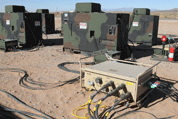Applications
- Telecom Power Systems
- Industrial Forklift Trucks
- Material Handling Equipment
- Military Power Generation
- Aviation Ground Support
- Welding
- UPS Systems
- Electric Vehicle
- Battery Chargers
- Industrial Test Equipment
- Public/Commercial Safety Systems
Features
- High reliability and quality - Tested in excess of 1,000,000 mechanical operations
- Rugged construction - Manufactured with heavy duty, high temperature, state-of-the-art materials
- Compact size - Ideally suited for small space requirements in DC power equipment
- Improved serviceability - Fewer fasteners and a more efficient design reduces time for component servicing or replacement
- Flexible mounting and installation - The unique mounting bracket system is designed to fit many standard and custom hole patterns
- Highly efficient magnetic circuit - Produces consistent operation in a smaller size
- High temperature coil construction - Capable of operating at 155°C and a flame retardant rating of UL-94VO
- Large cross section bus bars - Provides cooler operation at higher current levels
- High temperature insulating materials - Our glass-filled thermoset materials are capable of operating in excess of 180°C
- Silver alloy tips - New manufacturing technology produces high quality tips for extended life
- Double break contacts - allow operating voltages of 6-72 VDC
We have a wide range of both AC and DC contactors. In our DC contactors series we have ratings from 70 to 2,000 amperes: DC 100 amp 2 pole; and in our AC series ratings from 100 to 400 amperes 3 phase.
You can download our brochure: Heavy Duty Contactors' Brochure
DC Contactors
Main ratings:
DC currents to 2,000 amperes
Voltages up to 60 VDC
We have a large variety of "enclosed" bus bar configuration, or we can customize for your application.
Coil Specifications:
Standard DC coil voltages: 12, 24, 27, 28, 36, 48, 54, 72, 120
Duty cycles: intermittent duty, continuous duty, or magnetic latching contactors
Standard connection method: Quick Disconnects





